Putting An End to Music's Carbon Pollution
Music Decarbonization Project fast-tracks innovative climate solutions to directly eliminate carbon pollution from the music industry.
DECARBONIZATION PROJECTS

Concert Travel Study
First Comprehensive Study on Concert Travel Emissions
REVERB’s Concert Travel Study engaged over 35,000 fans at 400+ concerts to help us learn more about the issue, better understand how people are traveling to shows, and discover ways to encourage and enable more sustainable options.
REVERB partnered with data scientists at UMASS Amherst to analyze the data and released this first-of-its-kind report in April 2025 outlining results and strategies for the music industry to help reduce the climate impact of fan travel.
The survey was featured on several tours including:
Dave Matthews Band, Dead & Company, Guster, Paramore, The Lumineers, Young The Giant

Willie Nelson's Luck Reunion 2025
Clean Mobile Power Breakthroughs in Year 3 at Luck Ranch
- 3.8 METRIC TONS OF CO₂E AVOIDED
- 465 GALLONS OF DIESEL ELIMINATED
- 44.8% from the grid — a game-changing first. This setup eliminates the need for diesel generators where commercial-spec power isn’t available.
- 46.4% from pre-charged battery storage. Next year’s use is expected to be lower as grid-boosting proves reliable.
- 8.8% from solar power. Trouble-free and scalable for future expansion!
Luck was one of the first festivals in the U.S. powered by batteries. One of our goals with the Music Decarbonization Project is to prove that live music can be powered cleanly and efficiently.
In partnership with Overdrive Energy Solutions, we helped Luck Reunion go battery-powered in 2023 and 2024. Now, Luck is continuing on its own, showing that clean battery power isn’t just possible—it’s the future.
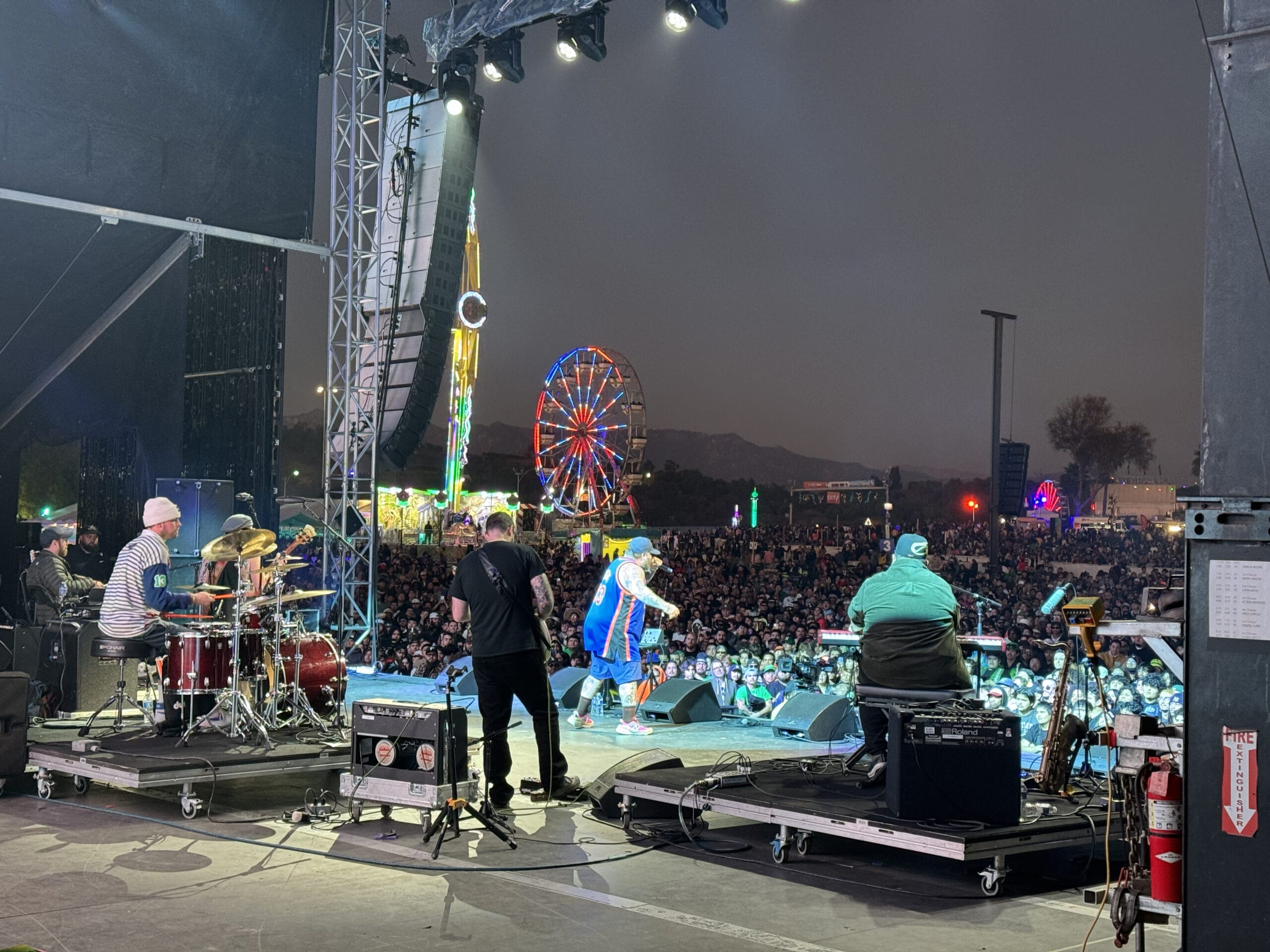
Camp Flog Gnaw 2024
First Major U.S. Hip Hop Festival with Battery-Powered Stages
- TWO OF THE THREE STAGES POWERED BY GRID BOOSTED BATTERIES AND ONSITE SOLAR GENERATION
- 4,261 GALLONS OF DIESEL AVOIDED
- 35.7 METRIC TONS OF CO₂E AVOIDED
At Tyler, the Creator’s sold-out Dodger Stadium festival, REVERB worked with Overdrive Energy Solutions and CES to eliminate the need for diesel generators for two of the stages by generating onsite solar and using batteries-systems, powering over fifty percent of the show.

Austin City Limits 2024
First Hybrid Battery System at a Major ACL Stage
- OVER 1 MWH OF BATTERY STORAGE CAPACITY DEPLOYED
Enough energy to power approximately 33 average homes for a full day
- 2,432 GALLONS OF DIESEL AVOIDED
- 15.38 METRIC TONS OF CO₂E AVOIDED
First time a hybrid battery system powered a major ACL stage alongside auxiliary festival areas
Austin City Limits Music Festival partnered with REVERB’s Music Decarbonization Project to utilize a hybrid battery system to replace diesel generators for the IHG® Hotels & Resorts stage, shade tents, and various backstage areas.

Goldenvoice’s First Fully Battery-Powered Festival Stage
Portola 2024
Goldenvoice’s First Fully Battery-Powered Festival Stage
- 100% BATTERY-POWERED FESTIVAL STAGE*
- 96% REDUCTION IN DIESEL**
Avoided the use of 6,053 gallons of diesel - 48.8 METRIC TONS OF CO2e AVOIDED
Portola, Goldenvoice, and AEG Presents teamed up with REVERB’s Music Decarbonization Project and Overdrive Energy Solutions to power the Ship Tent Stage with intelligent battery systems! No diesel generators ran during festival hours or when the stage was active!
*Batteries charged by Tier IV Generators using renewable diesel, cutting 99% of particulate matter and oxides of nitrogen
**Consumption estimates based on diesel generator @ ¼ load

Willie Nelson's Luck Reunion 2024
Festival-Wide Switch to Batteries
- 4 BATTERY-POWERED STAGES
Incorporated “grid boosting” technology to stabilize low-quality power, delivering high-quality energy efficiently
- OVER 90% REDUCTION IN DIESEL
Avoided the use of 904 gallons of diesel - 3.1 METRIC TONS OF CO2e AVOIDED
Following our successful rollout of solar-charged intelligent battery systems to power all four festival stages in 2023, Luck Reunion completely switched to batteries for their power needs on and off stage for 2024.
Artists in 2024 included: Willie Nelson • Tyler Childers • Dawes • Luscius • John Oates • Old Crow Medicine Show and 20 others!
Finding that reliability and costs of the new power systems were comparable to or even better than diesel generators, coupled with its clear environmental advantages, Luck Reunion is leaving fossil fuels in the past… and in the ground.
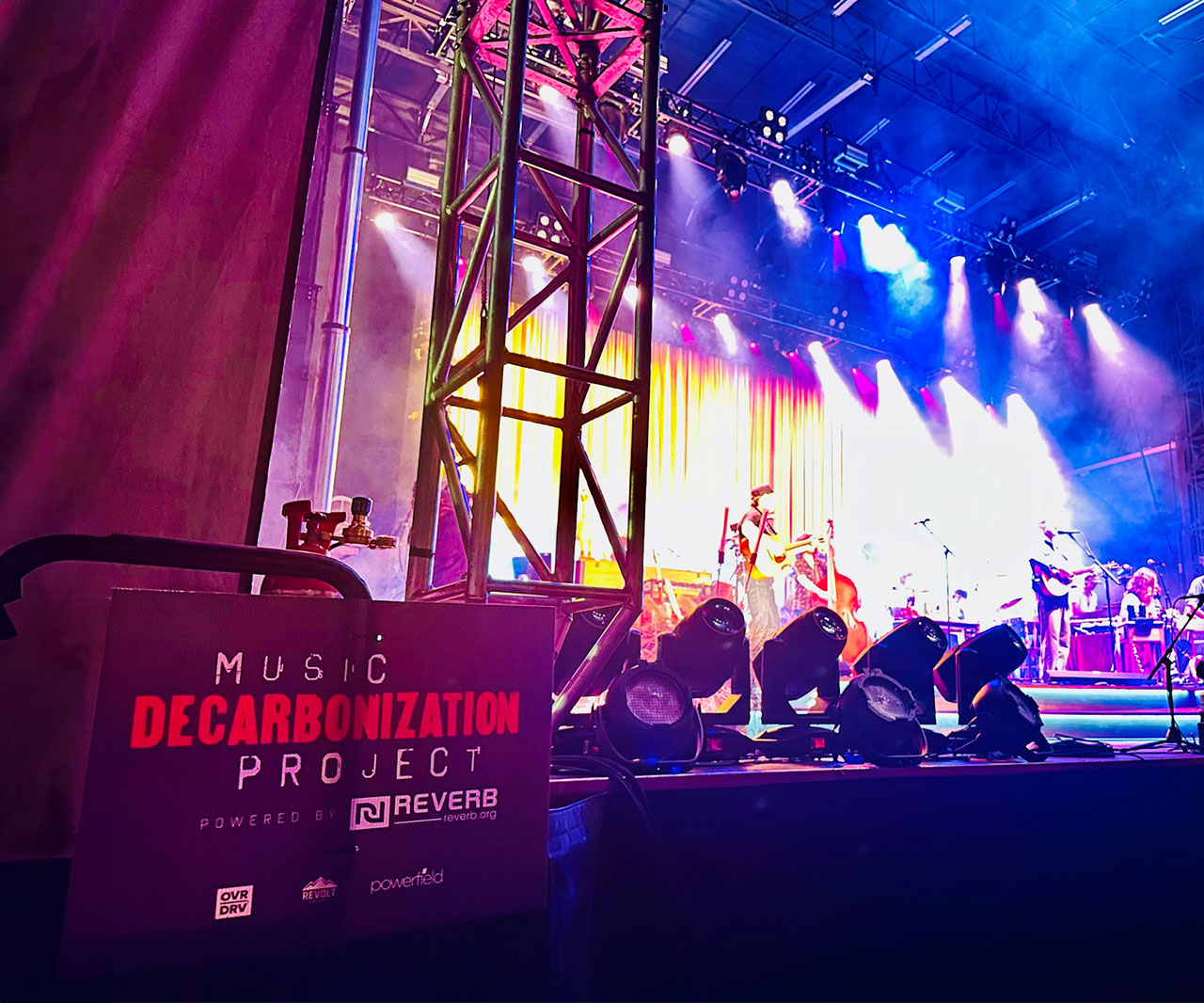
Healing Appalachia
First Fully Battery-Powered Festival in Coal Country
- 100% BATTERY-POWERED FESTIVAL
Stage • Tour Buses • Vendors • Food & Beverage
- 99% REDUCTION IN CO2e EMISSIONS
- 94% REDUCTION IN DIESEL
- 30+ METRIC TONS of CO2e AVOIDED
Healing Appalachia teamed up with REVERB’s Music Decarbonization Project and Overdrive Energy Solutions to use solar-charged intelligent battery systems to drastically reduce diesel fuel usage and greenhouse gas pollution at the 3-day festival.
HEADLINERS: Tyler Childers • My Morning Jacket • Sierra Ferrell
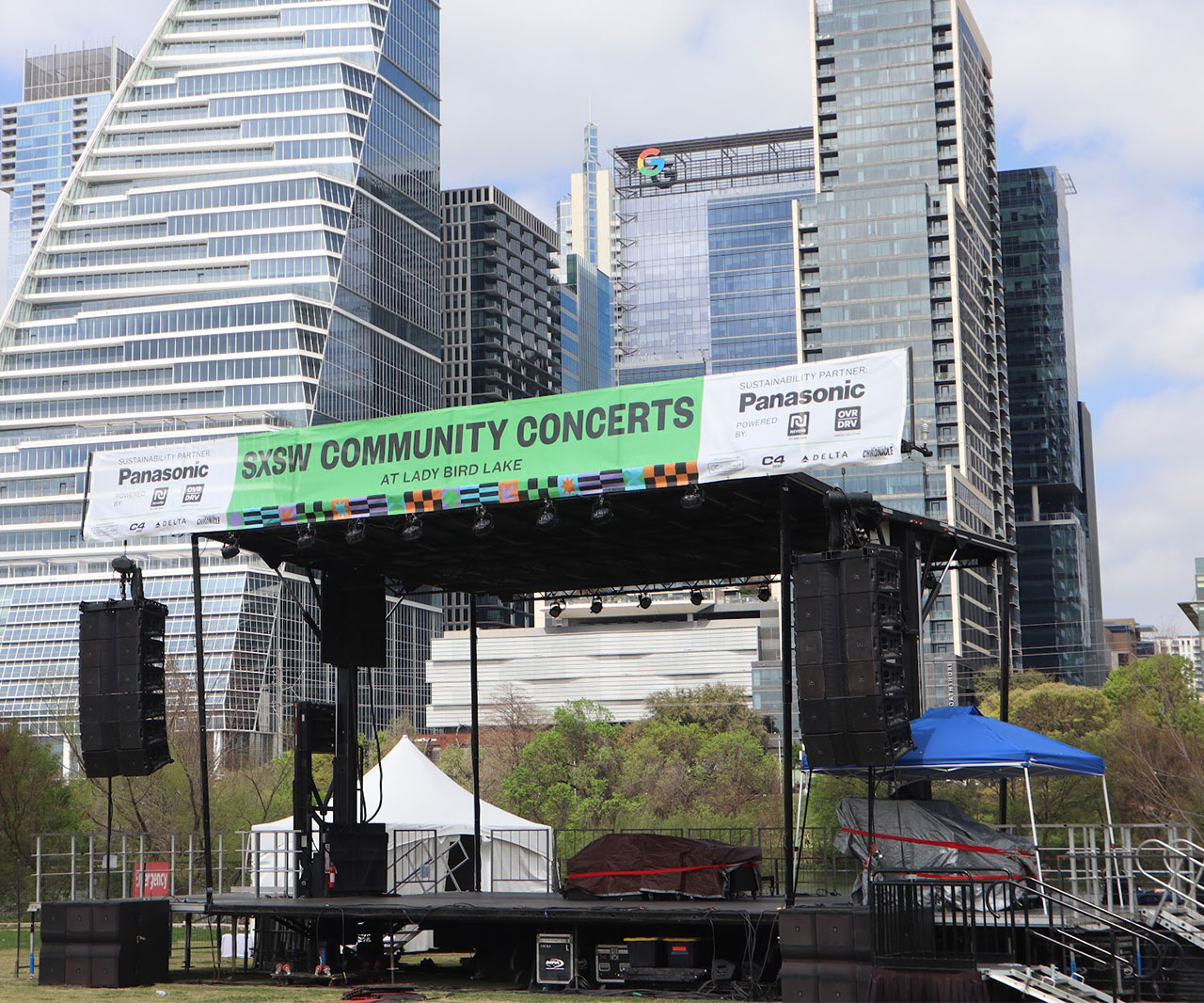
SXSW Community Concerts
First Battery Powered Series at SXSW’s Lady Bird Lake
SXSW’s Community Concerts Series at Lady Bird Lake was 100% battery-powered thanks to REVERB’s Music Decarbonization Project!
Using a combination of a temporary on-site solar array and grid power to charge the battery systems, SXSW was able to completely avoid diesel generators in 2024. SXSW’s Community Concerts stage is the festival’s largest, hosting 13,000 people each night.
This effort avoided 10 tons of CO2e pollution.
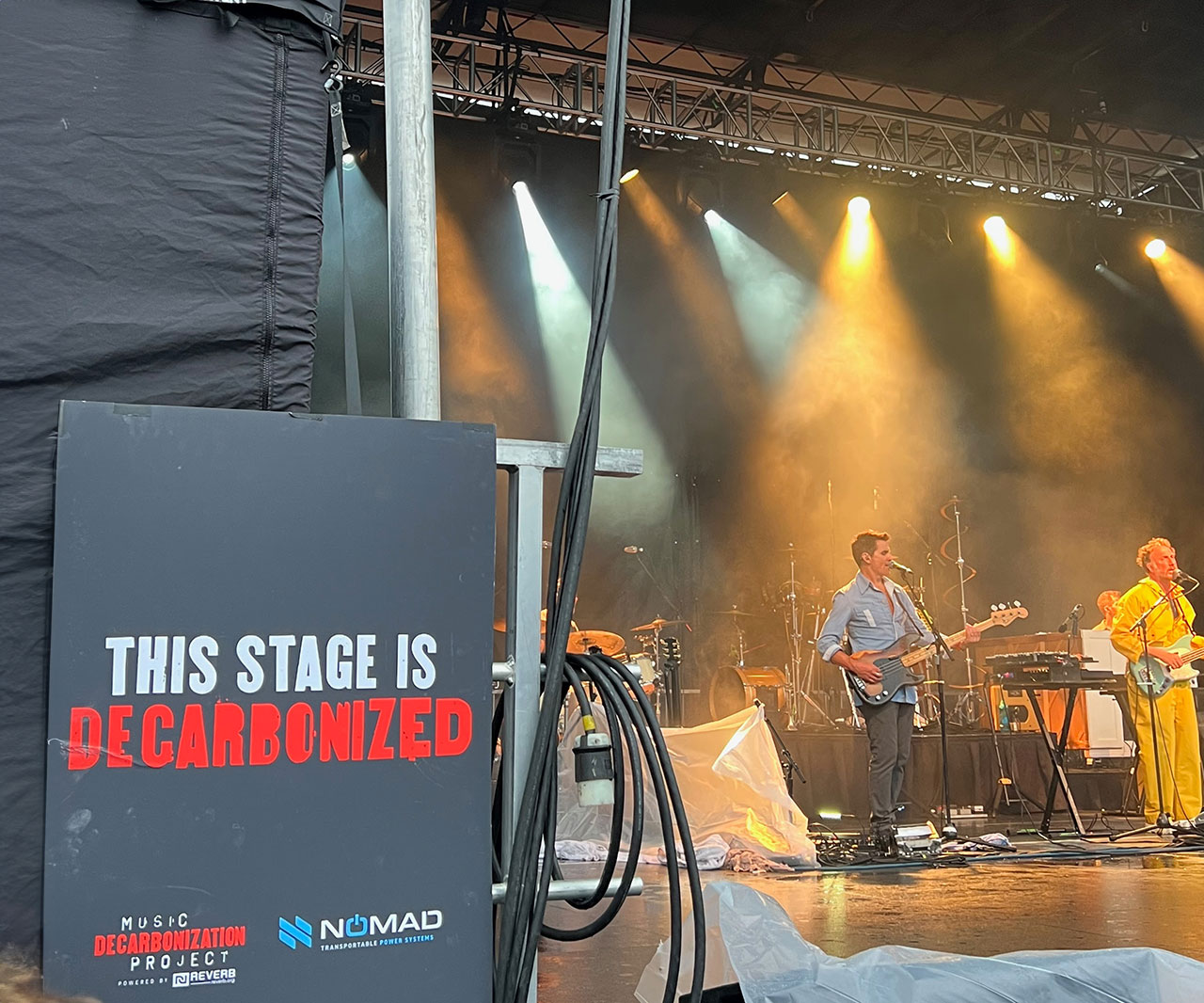
Higher Ground's Summer Concert Series
First Summer Concert Series in the U.S. Powered by Batteries
- 100% BATTERY-POWERED STAGE FOR THE ENTIRE SERIES
- FULLY ELIMINATED DIESEL GENERATOR USAGE
- AVOIDED 158.4 GALLONS OF DIESEL AT THE GUSTER CONCERT ALONE
- 1.5 METRIC TONS OF CO₂E AVOIDED AT THE GUSTER CONCERT
In a first-of-its-kind effort for a venue, Higher Ground Presents in Burlington, VT made the switch to battery systems to power their summer concert series at the Shelburne Museum!
Seeing the success of Music Decarbonization Project efforts, Higher Ground founder Alex Crothers ditched diesel and turned to Vermont-based NOMAD Transportable Power Systems for a battery system to completely power the stage for the 3,000-capacity venue. Charged via Vermont’s nearly 100% renewable energy power grid, the batteries drastically reduced greenhouse gas pollution at the venue!
2024 Artists Include: Guster • Jason Mraz • Lake Street Dive • Train • Rainbow Kitten Surprise, and more!

Billie Eilish: Lollapalooza 2023
First Large-Scale U.S. Festival Stage Powered by Solar + Storage
- 193 GALLONS OF DIESEL AVOIDED
- 1.02 METRIC TONS OF CO₂E AVOIDED
- 750 KWH OF SOLAR ENERGY GENERATED FROM ONSITE SOLAR ARRAY
One of the biggest artists in the world. One of the largest festival stages in the world. A new decarbonized future for live music.
Billie Eilish and REVERB’s Music Decarbonization Project partnered to power key stage elements with solar-charged intelligent battery systems for the artist’s headline set at Lollapalooza 2023.
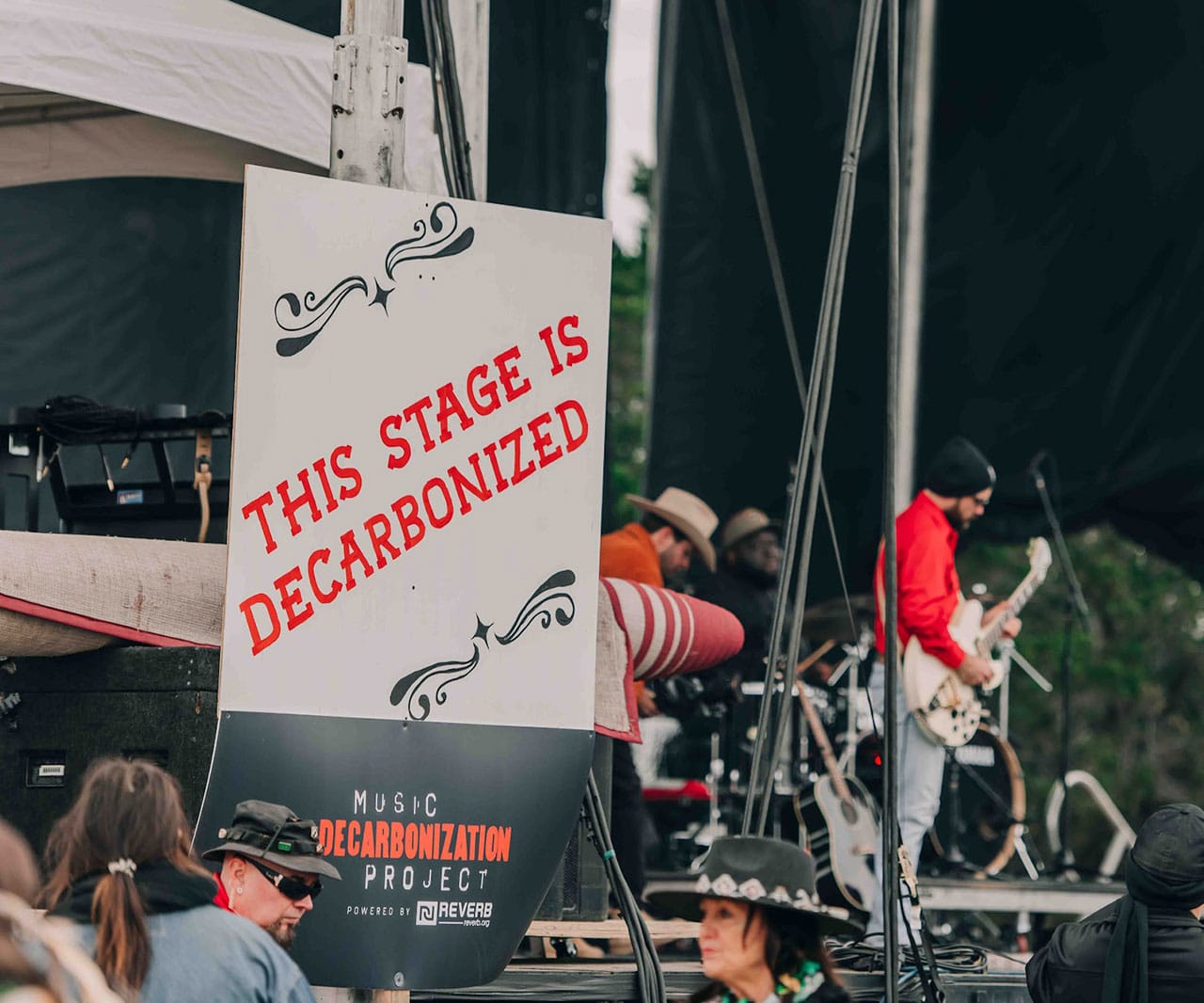
Luck Reunion 2023
Largest Solar-Powered Festival Stage of Its Kind (at the time)
With Performances by WILLIE NELSON, SPOON, MARGO PRICE, THE WAR AND TREATY, and more.
REVERB partnered with Luck Presents at Willie Nelson’s annual Luck Reunion Festival to replace diesel generators with solar-powered intelligent battery systems. This zero-emission power system reduced diesel fuel consumption and associated greenhouse gas pollution related to temporary power by over 90%.
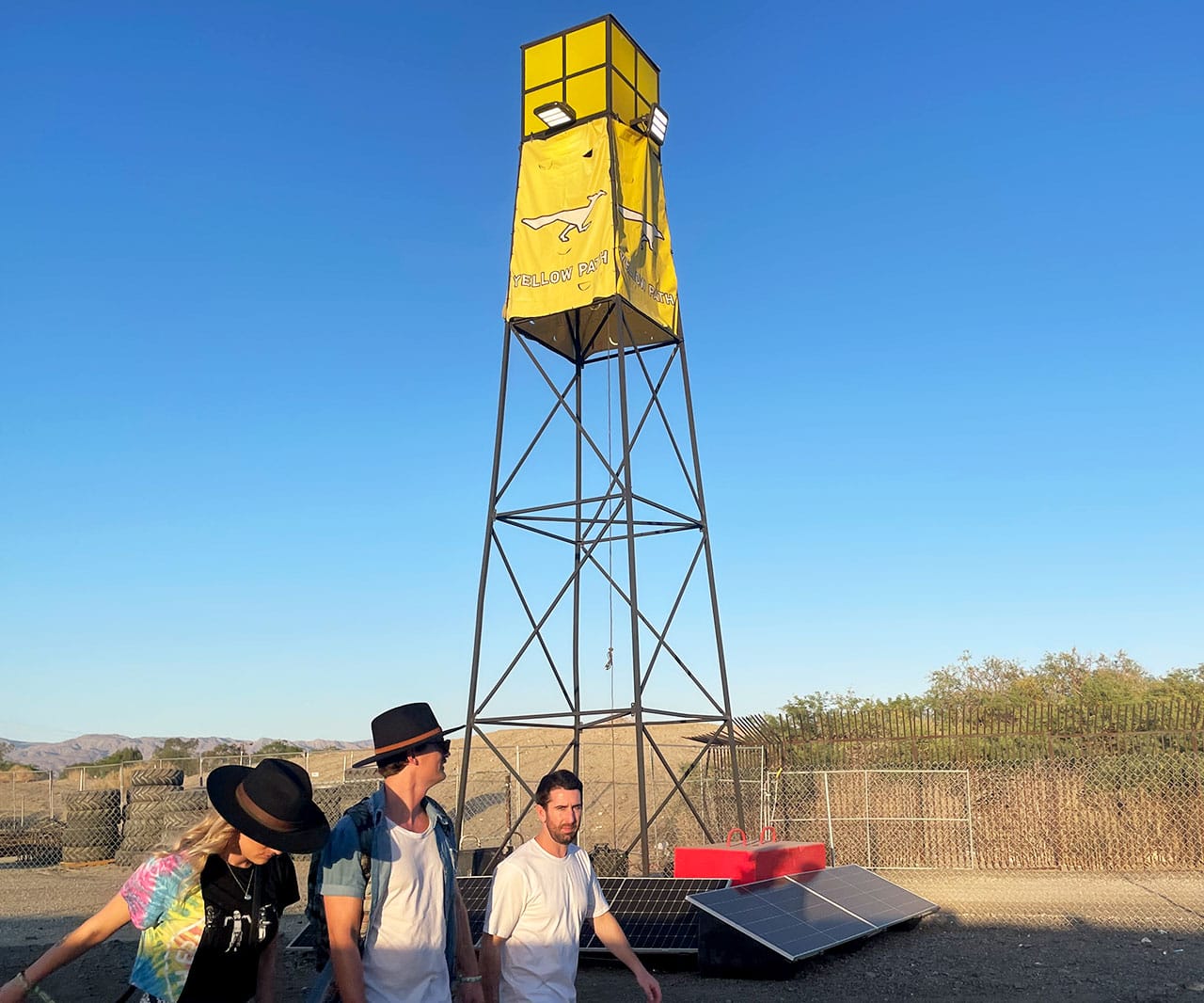
Coachella & Stagecoach 2023
100% Solar-Powered Festival Light Towers
REVERB’s Music Decarbonization Project helped Overdrive Energy Solutions fund, develop, and build 100% solar powered next-generation festival light towers to replace traditional diesel powered units. These new zero-emissions towers drastically reduce fuel consumption and related greenhouse gas emissions at festivals.

What is Decarbonization?
Decarbonization is the process of significantly reducing or eliminating greenhouse gas emissions, particularly carbon dioxide (CO2), that are released into the atmosphere from burning fossil fuels. It’s about transitioning to cleaner, sustainable energy solutions that reduce the carbon pollution causing the climate crisis.
By rapidly adopting clean power technologies and implementing solutions to reduce our carbon footprint, we can slow the planet’s warming and mitigate the most severe impacts of the climate crisis.
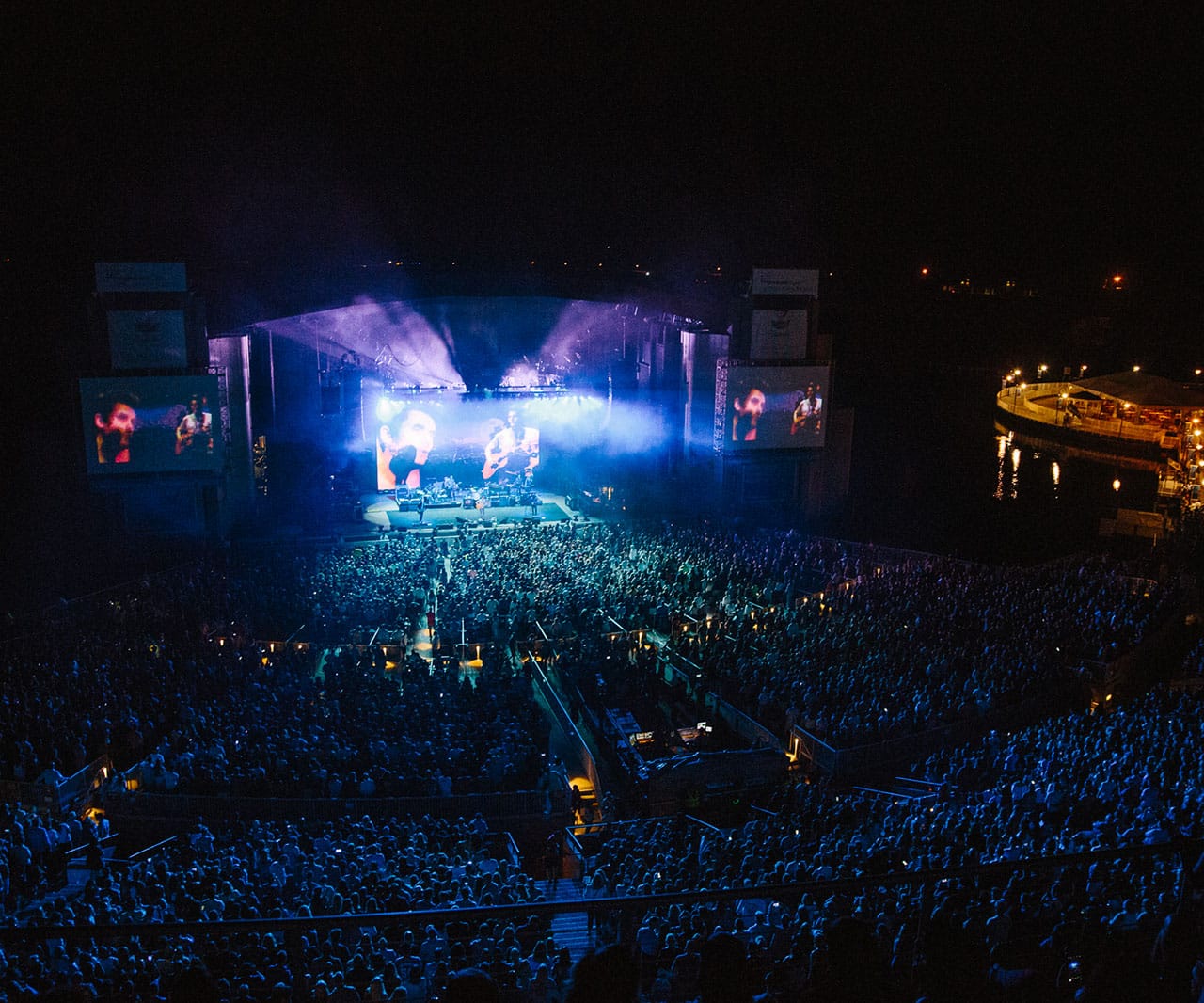
Decarbonizing Music
The music industry has a significant climate footprint, including intense energy needs, considerable travel, and complex supply chains. By embracing renewable energy, reducing emissions from touring, and rethinking operations with sustainability at the forefront, the industry can lead by example. REVERB’s Music Decarbonization Project is catalyzing this change and supporting the key industry stakeholders through the efforts to change the status quo.
While the music industry’s footprint may be lower than other sectors, its decarbonization efforts and cultural importance have the potential to create an outsized impact on climate action worldwide.
Get in touch!
Interested in how you can decarbonize your tour, festival, or venue?
Have a solution you feel can help music decarbonize?
Please fill out the form to get in touch!














